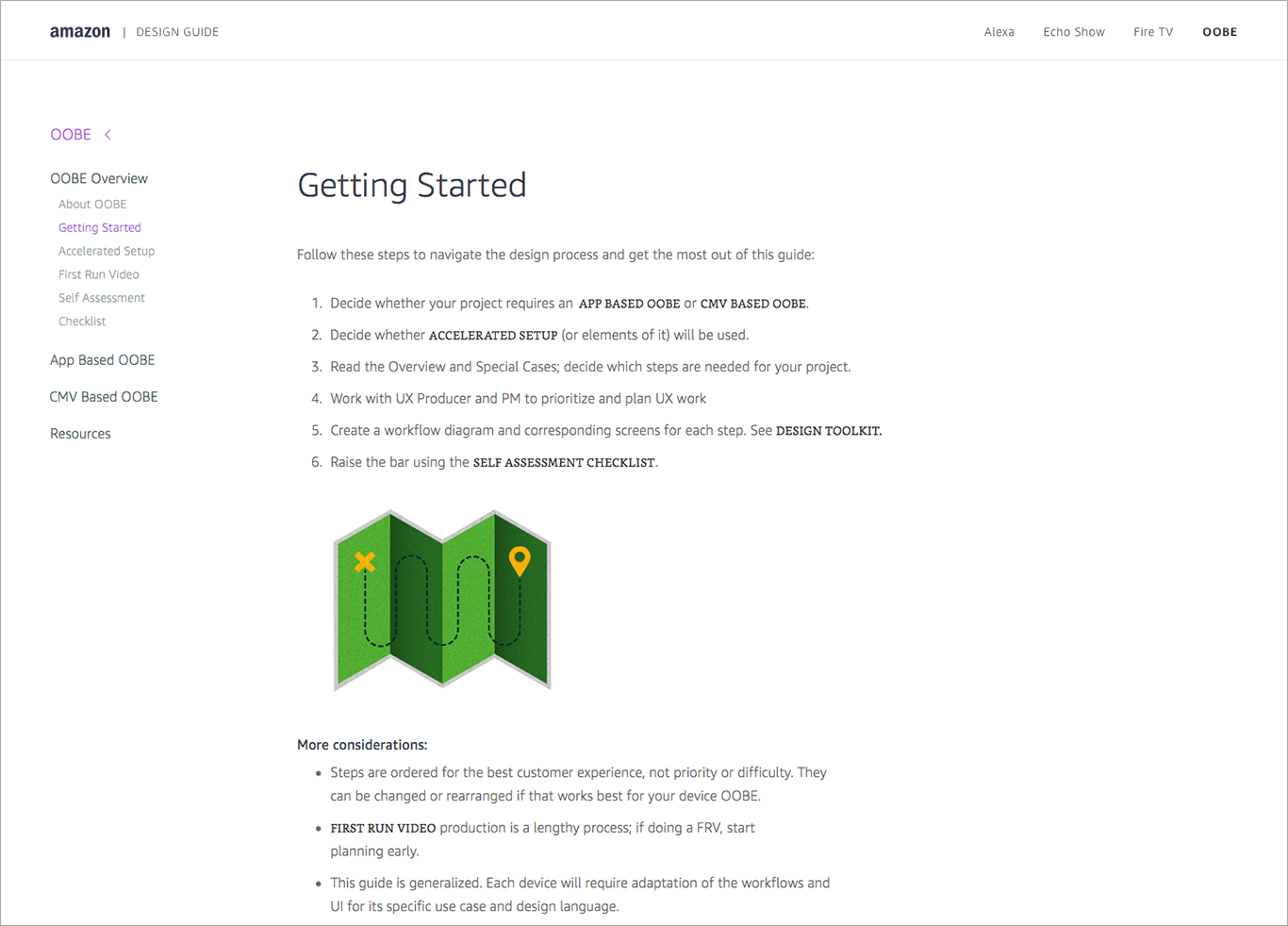OOBE Human Interface Guidelines
Project: Out of Box Experience (OOBE) Human Interface Guide (HIG) | Company: Amazon | Group: Device and Services Design Group | Team: 1 Senior Producer, 2 OOBE subject matter experts/editors | Title: Senior UX Designer | Duration: 5/17 - 2/18, Contract (TekSystems) | Location: Seattle, WA
Vision
Amazon Device and Services Design Group (DSDG) creates the OS experience for Fire TV, Fire Tablet, and a growing number of Echo devices with Alexa. One small team within the group, the Tiger Task Force, had become the subject matter experts that other teams turned to for out of box experience (OOBE), the series of steps needed to get customers up and running with a device. They realized they needed to share their knowledge or become both overspecialized and a bottleneck. They envisioned a human interface guideline (HIG), a step-by-step manual to empower UX designers and PMs to start designing their own OOBEs.
My role
Prior to my arrival, the team did exploratory research for the HIG but finally decided the project needed a dedicated designer. My challenges would be:
Create a framework for designers and PMs to approach OOBE.
Define the information architecture (IA) for the site's content.
Audit the OOBEs of Amazon devices to compare and define their steps.
Push designers to adopt next-generation technologies to improve OOBE for customers.
Build consensus within the team about OOBE best practices.
Write and illustrate OOBE steps with diagrams, interaction videos and example screens.
Create a design toolkit for designers to jumpstart their projects.
Process
New to the world of devices, I drank from the firehose for the first few weeks researching Amazon OOBEs. With this knowledge, I roughly designed the IA and page layouts and began the three month process of writing and illustrating. Our team met weekly to review progress, resolve questions, discuss issues, and commit to plans.
I audited all of Amazon device OOBEs, selecting nine for analysis and comparison.
Research
With many existing and upcoming devices and considerable variance in their OOBEs, I decided to do a full-audit. I consolidated design documents, interviewed designers and PMs, and organized information within a spreadsheet. I settled on nine established Amazon devices to analyze deeply, compare patterns, define terms, and establish the HIG's information architecture.
Ideation and Design
Another group in DSDG, solely focused on creating HIGs had developed a CMS with common styles. Our team negotiated to join this family of HIGS, allowing me to create layouts using common elements, and focus on content rather than designing the site from square one. Starting in Sketch, I wireframed page layouts for the OOBE screens, landing on a visually rich, consistent page structure. I then added content for several pages as a proof of concept.
Left to right, the evolution of workflow diagram styling
After validating the layouts and illustrations with designers, I took on the mountain of writing and content creation. My teammates provided editing and the work proceeded on schedule. All totaled, I wrote and illustrated 26 step pages and 7 pages of general information. Each OOBE step page would include:
Subway map style wayfinding graphic
Overview
Discussion of key topics
Bulleted details
Workflow diagram
Written step-by-step user path
Video of user interactions
Screen examples
Reference external links
Outcome
I recently put the finishing touches on the OOBE HIG and it is soon to be released and publicized within the Amazon design community. I delivered the HIG in five months, right on schedule, and at the right level of quality to provide discerning design teams with everything they need to create their own OOBEs. Multiple teams have expressed interest in using the HIG and I look forward to their feedback. In the meantime, I've accepted an offer to join the HIG team and contribute to other projects for an additional three months.











